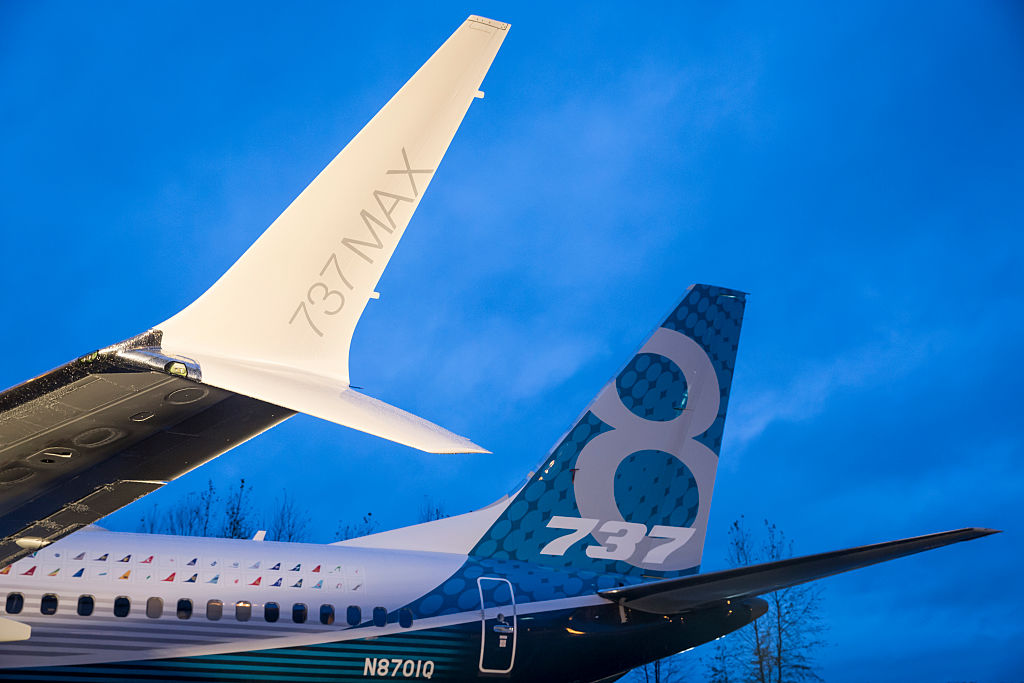More countries ground Boeing 737 MAX jets after the Ethiopian Airlines crash, despite FAA safety assurance


A free daily email with the biggest news stories of the day – and the best features from TheWeek.com
You are now subscribed
Your newsletter sign-up was successful
On Tuesday, Australia and Singapore temporarily barred Boeing 737 MAX aircraft from flying in and out of their airports, following Monday's decision by China, Indonesia, and several national airlines to ground all 737 MAX jets following a fatal crash in Ethiopia on Sunday. Almost 40 percent of the 371 Boeing 737 MAX jets in service globally have been grounded, Flightglobal reports, including China's 97 jets and Brazilian carrier Gol Airlines 121 MAX 8 aircraft.
To assuage concerns about the safety of the MAX 8 — Sunday's Ethiopian Airlines crash was the second in five months for that model of Boeing aircraft — the U.S. Federal Aviation Administration issued a "continued airworthiness notification" for 737 MAX aircraft. Boeing said it will be rolling out improvement to the 737 MAX flight control software in coming weeks.
Before the Ethiopia Airlines crash, The New York Times details, the 737 MAX 8 made about 8,500 flights a week. It is the world's fastest-selling modern aircraft, and with 4,661 on order, Reuters says, "737 MAX 8s could become the workhorses for airlines around the globe for decades." Boeing shares closed down 5 percent on Monday, paring earlier, steeper losses.
The Week
Escape your echo chamber. Get the facts behind the news, plus analysis from multiple perspectives.

Sign up for The Week's Free Newsletters
From our morning news briefing to a weekly Good News Newsletter, get the best of The Week delivered directly to your inbox.
From our morning news briefing to a weekly Good News Newsletter, get the best of The Week delivered directly to your inbox.
Airlines in the the U.S., Canada, the Middle East, and Europe are continuing to fly their 737 MAX 8s, and officials in the U.S. and Europe say they're "confident that pilot training, maintenance practices, and safeguards in place will prevent a catastrophe such as the one that killed 157 people in Ethiopia on Sunday," The Washington Post reports. "For the countries and airlines that have grounded the plane, the decision reflects fears about their unfamiliarity with the new technology and the potential fallout from a catastrophe — particularly for new and smaller carriers."
A free daily email with the biggest news stories of the day – and the best features from TheWeek.com
Peter has worked as a news and culture writer and editor at The Week since the site's launch in 2008. He covers politics, world affairs, religion and cultural currents. His journalism career began as a copy editor at a financial newswire and has included editorial positions at The New York Times Magazine, Facts on File, and Oregon State University.
-
 The Gallivant: style and charm steps from Camber Sands
The Gallivant: style and charm steps from Camber SandsThe Week Recommends Nestled behind the dunes, this luxury hotel is a great place to hunker down and get cosy
-
 The President’s Cake: ‘sweet tragedy’ about a little girl on a baking mission in Iraq
The President’s Cake: ‘sweet tragedy’ about a little girl on a baking mission in IraqThe Week Recommends Charming debut from Hasan Hadi is filled with ‘vivid characters’
-
 Kia EV4: a ‘terrifically comfy’ electric car
Kia EV4: a ‘terrifically comfy’ electric carThe Week Recommends The family-friendly vehicle has ‘plush seats’ and generous space
-
 TikTok secures deal to remain in US
TikTok secures deal to remain in USSpeed Read ByteDance will form a US version of the popular video-sharing platform
-
 Unemployment rate ticks up amid fall job losses
Unemployment rate ticks up amid fall job lossesSpeed Read Data released by the Commerce Department indicates ‘one of the weakest American labor markets in years’
-
 US mints final penny after 232-year run
US mints final penny after 232-year runSpeed Read Production of the one-cent coin has ended
-
 Warner Bros. explores sale amid Paramount bids
Warner Bros. explores sale amid Paramount bidsSpeed Read The media giant, home to HBO and DC Studios, has received interest from multiple buying parties
-
 Gold tops $4K per ounce, signaling financial unease
Gold tops $4K per ounce, signaling financial uneaseSpeed Read Investors are worried about President Donald Trump’s trade war
-
 Electronic Arts to go private in record $55B deal
Electronic Arts to go private in record $55B dealspeed read The video game giant is behind ‘The Sims’ and ‘Madden NFL’
-
 New York court tosses Trump's $500M fraud fine
New York court tosses Trump's $500M fraud fineSpeed Read A divided appeals court threw out a hefty penalty against President Trump for fraudulently inflating his wealth
-
 Trump said to seek government stake in Intel
Trump said to seek government stake in IntelSpeed Read The president and Intel CEO Lip-Bu Tan reportedly discussed the proposal at a recent meeting
